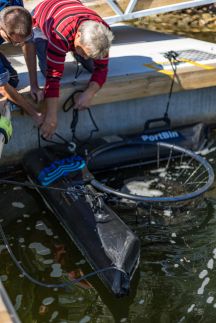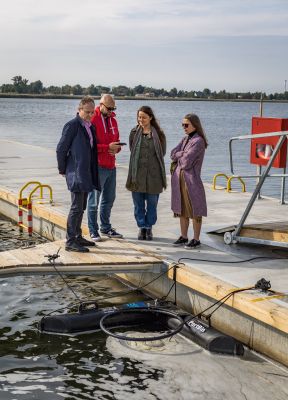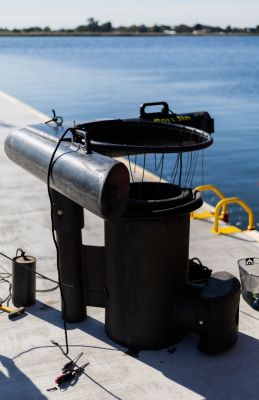ANOTHER MARINE LITTER BIN FOR A CLEANER BALTIC
The impact of plastic on the environment and our health is a well-known fact. Despite this fact, 4.8 to 12.7 million tonnes of plastic end up in the seas and oceans every year. Solving this problem requires actions on land to reduce the amount of produced waste which enters the seas and actions in the sea to remove the litter. To help the Baltic, the MARE Foundation installs marine litter bins in Baltic ports. These bins are able to collect up to 1.400 kg of litter from water. Thanks to the cooperation with the Gdańsk Sports Centre and the financial support of the Neboa company, a Portbin was installed on the Sobieszewo Island, in the new Marina. The bin collects waste directly from water. This is the third bin installed by the MARE Foundation!
The installation of marine litter bin is a project that the MARE Foundation plans to develop. We are looking for the best available technologies. We believe that such bins should be installed in every marina and port on the Polish coast. This solution can help to measurably improve the state of the environment. The bins skim the surface of the water by pumping water into the devices through filters. One bin can collect up to 1.400 kg of waste per year.
The problem of plastic pollution has a global dimension and is also encountered in the Baltic. According to HELCOM, approximately 70% of waste found in the Baltic is plastic. Plastic also accounts for most of the litter found on the coast, regardless of place, both on urban and wild beaches.
What happens to the plastic in the sea? Part of it is swallowed by animals as food, impairing the feeling of hunger and thus causing their death from starvation. As a result of salt water, solar radiation and the effect of waves, plastics turn into microplastics, i.e. particles smaller than 5 millimetres or even smaller nanoplastics. These particles, suspended in water column, enter the tissues of organisms that feed through filtering (e.g. mussels), and then enter higher elements of the food chain, such as fish and crustaceans. They cannot be removed from the environment and return to us as part of the food chain. Microplastics can be found in drinking water and food products, such as salt and honey. Their effects on human health are not yet known.
PortBin collects debris floating on water surface into the bin. The skimmer removes floating bottles and other waste. The SpillTech company has developed a complete line of high-tech products used for collecting floating garbage. PortBin is an optimal solution used to collect floating garbage in ports. More information at PortBin tide | SpillTech





